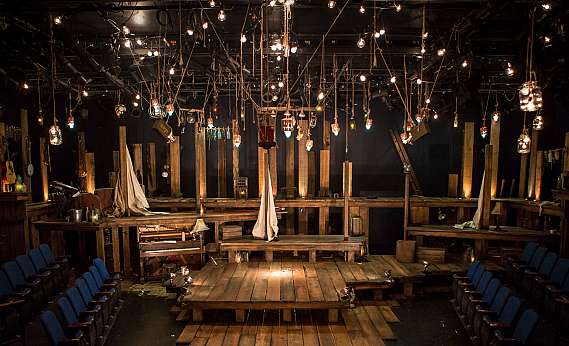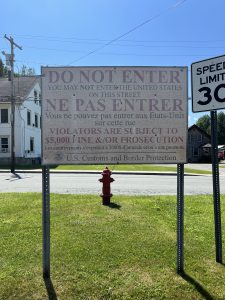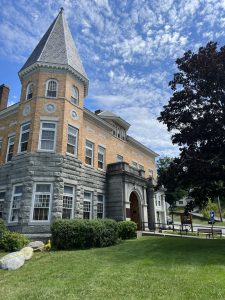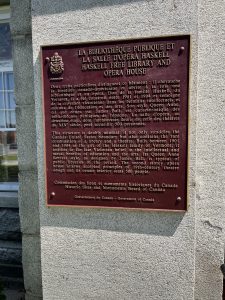A seemingly quiet library serves as the backdrop of Kareem Fahmy’s new play, A Distinct Society, but Director of Artistic Development Bobby Kennedy explores its fascinating history and how one Executive Order changed everything.
The Vermont-Quebec border is almost 500 miles from Washington, D.C. And yet, when border policy changes, the Haskell Free Library & Opera House is one of the main places the change is felt. Built in 1904 deliberately over the US-Canada border, the Library was meant to keep the towns of Stanstead, Quebec and Derby Line, Vermont intricately linked. Despite not being an official border crossing, Canadian residents could use a sidewalk to walk across the international border and access the Library through its main entrance in the United States—so long as they returned to Canada when finished. Border enforcement was not a priority at this location. Even after monitoring of the border intensified after the September 11th attacks, the Library continued to operate in both countries without much notice.
That all changed in the past decade. During the 2016 presidential campaign, Donald Trump called for “a total and complete shutdown of Muslims entering the United States until our country’s representatives can figure out what the hell is going on.” He continued to reiterate in many of his campaign speeches that there were “terror-prone regions” and “areas of the world” with a history of terrorism, and that programs resettling refugees from these countries in the US were creating “a rich pool of potential recruiting targets for Islamic terror groups.”
On January 27th, 2017, eight days after taking office, President Trump issued Executive Order 13769, titled “Protecting the Nation from Foreign Terrorist Entry into the United States.” The order reduced the number of refugees allowed into the country, suspended the U.S. Refugee Admissions Program for 120 days, suspended entry of Syrian refugees indefinitely, and suspended entry of all citizens from Iran, Iraq, Libya, Somalia, Sudan, Syria and Yemen for 90 days. Religious minorities in these countries were granted an exemption, but green-card holders and those already granted valid visas were not excused from the suspensions.
There was immediate outcry and condemnation of the order from Democrats and other world leaders. Critics began referring to the order as the “Muslim Ban,” in reference to President Trump’s comments during his campaign. Beginning on January 28th, protesters began gathering at the nation’s airports to call for the release of any detained travelers. Legal challenges to the order were swiftly filed and the judge presiding in State of Washington v. Trump issued a temporary restraining order on February 3rd that blocked the executive order’s major provisions. An appeal by the Trump administration to lift the restraining order was denied by an Appellate Court a week later.
On March 6th, a new Executive Order 13780 was issued to replace the prior order. Iraq was removed from the list of countries with a 90-day restriction on entry, visa and green card holders were exempted from the restrictions, and the exemption for religious minorities was dropped. The new order nonetheless also faced immediate legal challenges, and a judge presiding in State of Hawaii v Trump issued another temporary restraining order on March 15th. The case eventually reached the Supreme Court which allowed most of the order’s provisions to take effect on June 26th.
When the 90-day order was set to expire on September 24th, President Trump issued Presidential Proclamation 9645 which extended the ban indefinitely, adding nationals of North Korea, Chad and certain government officials from Venezuela to the list, while removing Sudan. The State of Hawaii amended their previous lawsuit to apply to the new proclamation, and a judge placed a new temporary restraining order on its provisions on October 17th. However, the US Supreme Court agreed to hear the case and allowed the ban to take effect until issuing its ruling. On June 26, 2018, in a 5-4 decision, the Supreme Court ruled that the president was acting within his powers and allowed the proclamation to stand.
Sometime after these executive orders went into effect, word spread about the Haskell Free Library & Opera House’s special situation. By 2018, families separated by the new border policies were using it as a location for reunions. A Reuters article from November 2018 documents the story of some of these families—and it was this article that would inspire playwright Kareem Fahmy to write A Distinct Society. The article also includes statements from Haskell Library staff claiming that both American and Canadian border officials were unhappy about these family meetings and voiced concerns that the library may need to be shut down. Shortly before the article was published, the Haskell Library’s board of trustees decided to post signs saying family reunions were no longer allowed.
The “Trump travel ban,” as the proclamation has come to be known, remained in effect for the rest of President Trump’s term. Chad was removed from the list of restricted countries in April 2018, while Eritrea, Kyrgyzstan, Myanmar and Nigeria were added to the list in February 2020. On January 20, 2021, on his very first day in office, President Joe Biden issued Proclamation 10141 which revoked the Trump administration’s orders and reestablished travel and immigration from the affected countries. The Haskell Free Library, which had been closed since 2020 due to the pandemic, fully reopened to the public in spring 2022. Tours of the building are offered to visitors, but a message on their website still states “family/friend reunions (cross-border visits) are not allowed.”





No comments yet.